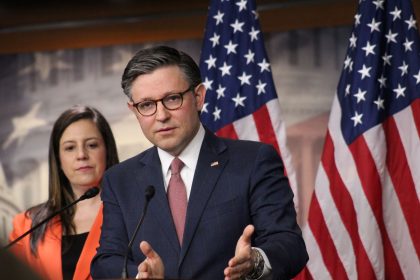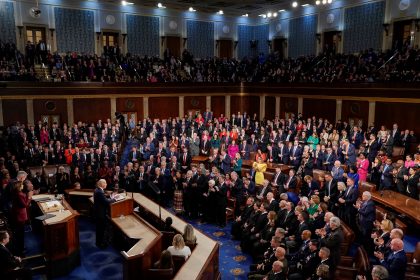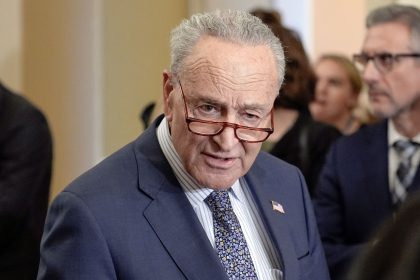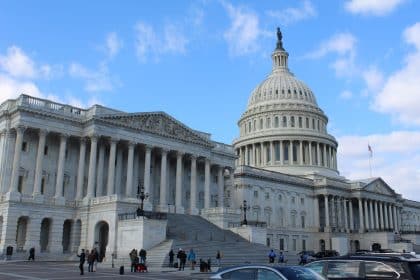Senate Passes $1.7T Spending Bill, Sends on to House
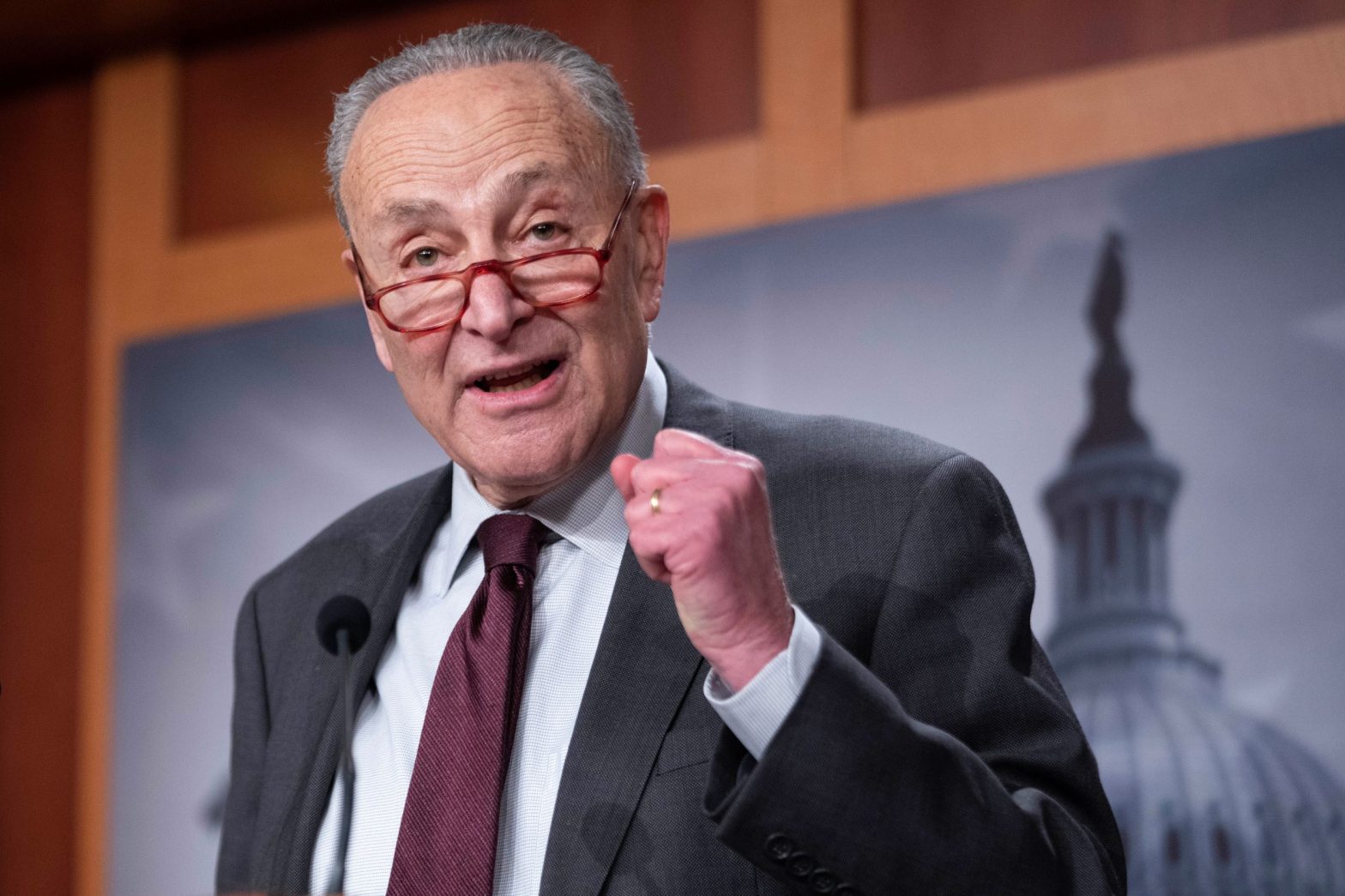
WASHINGTON — The Senate passed a sweeping $1.7 trillion spending package Thursday, overcoming last minute objections related to the future of Title 42, and sending the measure on to the House in time to avert a partial government shutdown.
The measure, which clocks in at some 4,155 pages, passed by a vote of 68-29.
The House is expected to vote on it sometime tonight and send it on to President Joe Biden to be signed into law.
“After a lot of hard work and compromise, the Senate is funding the government with an aggressive investment in American families, American workers, and America’s national defense,” said Senate Majority Leader Chuck Schumer, D-N.Y.
“This is one of the most significant appropriations packages we have done in a very long time — the range of people it helps is large and deep,” he said.
On Wednesday Senate Republican leader Mitch McConnell, R-Ky., had called the bipartisan government funding bill, “imperfect but strong,” noting that “it will make huge new investments in our Armed Forces while cutting non-defense, non-veterans baseline spending in real dollars.
“If Senate Republicans controlled this chamber, we would have handled the appropriations process differently from top to bottom,” McConnell said. “But given the reality of where we stand today, senators have two options this week: We will either give our Armed Forces the resources and certainty that they need, or we will deny it to them.”
The bill sent to the House this afternoon includes about $772.5 billion for domestic programs and $858 billion for defense and would finance federal agencies through the fiscal year at the end of September.
It includes nearly $50 billion in assistance to Ukraine, easily overcoming any opposition after Ukraine President Volodymyr Zelenskyy’s daring trip to the United States on Wednesday and his appearance before a joint session of Congress last night.
Complementing that funding is a bipartisan amendment introduced by Sens. Lindsey Graham, R-S.C., and Sheldon Whitehouse, D-R.I, that allows the sale and proceeds from assets — including seized mega-yachts, private jets, mansions, and expensive art — from sanctioned Russian oligarchs and entities supporting Putin to be used to the benefit of the Ukrainian people.
“This change in U.S. law allows the proceeds of seized assets to support Ukrainian war efforts, which is a win-win for the people of Ukraine and the American taxpayer,” Graham said. “I expect over time billions of dollars in seized assets will be sent to help Ukraine in their fight for freedom. Our amendment also takes pressure off the American taxpayer.”
“President Zelenskyy’s address last night was a reminder of what Senator Graham and I have believed from the earliest days — victory for Ukraine can be achieved with our continued support,” Whitehouse said.
“[This] amendment … gives the Biden administration authority to transfer the proceeds from recovered Russian oligarch assets back to the victims in Ukraine. It unlocks billions of dollars for the Ukrainian people to rebuild their schools, hospitals, homes, and critical infrastructure that Putin’s military has destroyed — all at no cost to the American taxpayer.”
The bill also includes the Electoral Count Act, a bipartisan overhaul of the 135-year-old law that former President Donald J. Trump and his allies sought to exploit in an effort to stop the certification of the 2020 election.
Intended to address the vulnerabilities and ambiguities of the original act, passed in 1887, ahead of the 2024 election, it will clarify the specific roles and duties of Congress and the vice president in counting the Electoral College certificates, and ensures that Congress will receive and consider electoral votes that reflect the results of the popular election.
Another measure rolled into the spending package, SECURE 2.0, aims to bolster Americans’ short- and long-term savings, and builds on similar legislation passed in 2019.
Among other important provisions, this legislation will remove outdated legal and regulatory barriers and establish guardrails and flexibility for employers seeking to automatically enroll employees into an emergency savings account within their existing retirement plan.
Then there’s the PREVENT Pandemics Act, which is intended to ensure the government implements lessons learned from the COVID-19 pandemic to better prepare for future public health challenges.
Another interesting measure added to the spending bill this week is the Growing Climate Solutions Act which will make it easier for farmers, ranchers, and private forest owners to participate in carbon credit markets.
The bill also contains $40 billion in emergency aid for communities recovering from natural disasters, a ban on the Chinese-owned app TikTok on government devices and new rules intended to help Americans save and pay for retirement.
It includes a provision proposed by Sen. Kirsten Gillibrand, D-N.Y., and Schumer that would put another $1 billion in the health fund for emergency responders and survivors of the Sept. 11, 2001, terrorist attacks.
“This legislation strengthens American workers and families,” said Jason Grumet, president of the Bipartisan Policy Center, noting that many of the measures mentioned above were also policy priorities of his organization.
“The omnibus invests in mental health, helps workers and families save for emergencies, prepares communities for future pandemics, supports farmers, ranchers, and forest landowners pursuing sustainable agriculture practices to mitigate climate change, and reforms the Electoral Count Act. This legislation is a fitting conclusion to a very productive and surprisingly bipartisan 117th Congress,” he said.
Other measures included getting a big thumb’s up from the BPC on Thursday were the Pregnant Workers Fairness Act, which will guarantee pregnant women the right to reasonable workplace accommodations, and crucial funding for clean energy innovation, child care support for families, state and local elections departments, small businesses, affordable housing, and congressionally directed spending for local community projects.
“BPC and BPC Action have been hard at work for years on many of the provisions included in this omnibus bill,” said Michele Stockwell, senior vice president of the Bipartisan Policy Center and executive director of BPC Action, its political action arm.
“The substantial bipartisan wins in this Congress are a testament to leadership and many members working across the aisle, and this adds to that list of accomplishments. We encourage the next Congress to continue this bipartisan streak as they approach more of these issues critical to communities and individuals, from agriculture to affordable housing to competitiveness to substance abuse,” she said.
As is almost always the case, the biggest sticking point arose near the end of negotiations, when the talks got tangled up with the debate over the future of Title 42, the Trump-era policy that allows the federal government to expel migrants who cross the southwestern border on public health grounds.
The future of the policy is in limbo this week as Chief Justice John Roberts placed a temporary hold on the termination of the controversial policy that was to have occurred on Wednesday.
In response, Sen. Mike Lee, R-Utah, demanded a vote on an amendment that would allocate a portion of the Department of Homeland Security’s funding for the year to the continuation of pandemic-era border restrictions.
Most Senate Democrats oppose continuing the policy, but Lee and some of his Republican colleagues in the Senate believe they had enough Democratic votes to pass the amendment.
Because it was believed passage of such an amendment would kill the omnibus package in the House, Sens. Jon Tester, D-Mont., and Kyrsten Sinema, I-Ariz., floated a separate amendment that would extend Title 42 until a plan was in place to deal with a recent surge of illegal border crossings.
The dual amendments effectively enabled lawmakers voting in favor of them to state their political position while still voting to advance the larger package.
Among the 29 senators who voted against the omnibus spending bill was Sen. Mike Crapo, R-Idaho, who decried the vote on a massive bill no one could possibly have read in its entirety.
“Instead of moving forward with individual spending bills to allow members of Congress to separate good policy from bad, we are once again having to vote on a single bill that will unfortunately add to our unsustainable debt crisis,” Crapo said.
“The omnibus appropriations package contains some good policies I have supported and championed, like robust support for our servicemembers and their missions, and support for homeless veterans. It also includes legislation I authored as the top Republican on the Senate Finance Committee, including important legislation to strengthen retirement savings and improve federal health programs,” he continued.
“Unfortunately, these bipartisan provisions were combined with dozens of other provisions that likely would not have passed on their own, from Green New Deal style handouts to wasteful pet projects,” Crapo said. “Other broadly bipartisan items were woefully omitted, including widely-supported trade priorities and critical business tax incentives, particularly R&D tax credits that incentivize innovation and growth.
“Unrestrained federal spending over the past two years has led to one of the most expensive holiday seasons in history. Idahoans are paying an estimated additional $819 per month — an increase of 16.5% — compared to two years ago.
“This behemoth funding package will only add fuel to the current inflationary fire. It is past time to rein in reckless, unnecessary government spending and get our fiscal house in order,” he added.
Dan can be reached at [email protected] and at https://twitter.com/DanMcCue



















